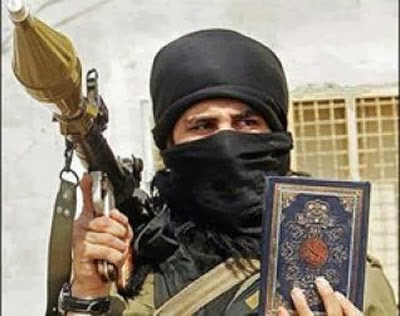From the article:
In an effort to buttress the Iraqi military’s abilities, the Obama administration has sought congressional approval to lease and eventually sell Apache helicopter gunships. But some lawmakers have been hesitant, fearing that they might be used by al-Maliki to intimidate political opponents. [Emphasis added.]
No doubt the same Senators who want greater sanctions against Iran, just as the US is negating a peace treaty with Iran and Russia and China and France and England and Germany. Those Senators like Sunni extremists. I wonder why. Are the Senators ideologically committed to Sunni jihadists, or are they paid for a commitment? Or both? In any case they are not a credit to America.
allie durell douthit
3423 francis street
808/675-8750
ddouthit@mac.com
შეიძლება თქვენ ფეხით სილამაზე.
Dallas Morning News, by way of The New York Times
Karim kadim/The Associated Press
A man stood guard while women walked through the site of a bombing in a Christian section of Baghdad on Wednesday.
Published: 25 December 2013 10:56 PM
Updated: 25 December 2013 11:00 PM
U.S. sends arms to help Iraqis fight extremists
WASHINGTON — The United States is quietly rushing dozens of Hellfire missiles and low-tech surveillance drones to Iraq to help government forces combat an explosion of violence by an al-Qaeda-backed insurgency that is gaining territory in both western Iraq and neighboring Syria.
The move follows an appeal for help in battling the extremist group by Iraqi Prime Minister Nouri al-Maliki, who met with President Barack Obama in Washington last month.
But some military experts question whether the patchwork response will be sufficient to reverse the sharp downturn in security that has already led to the deaths of more than 8,000 Iraqis this year, 952 of them Iraqi security force members, according to the United Nations, Iraq’s highest level of violence since 2008.
Al-Qaeda’s regional affiliate, the Islamic State in Iraq and the Levant, has become a potent force in northern and western Iraq. Riding in armed convoys, the group has intimidated towns, assassinated local officials and, in an episode last week, used suicide bombers and hidden explosives to kill the commander of the Iraqi army’s 7th Division and more than a dozen of his officers and soldiers as they raided an al-Qaeda training camp near Rutbah.
Bombings in Christian areas of Baghdad on Christmas Day, which killed more than three dozen people, also bore the hallmarks of an al-Qaeda operation.
The surge in violence stands in contrast to earlier assurances from senior Obama administration officials that Iraq was on the right path, despite the failure of U.S. and Iraqi officials in 2011 to negotiate an agreement for a limited number of U.S. forces to remain in Iraq.
Iraq’s foreign minister has floated the idea of having U.S.-operated, armed Predator or Reaper drones respond to the expanding militant network. But al-Maliki, who is positioning himself to run for a third term as prime minister and who is sensitive to nationalist sentiment at home, has not formally requested such intervention.
The idea of carrying out such drone attacks, which might prompt the question of whether the Obama administration has succeeded in bringing the Iraq war to what the president has called a “responsible end,” also appears to have no support in the White House.
“We have not received a formal request for U.S.-operated armed drones operating over Iraq, nor are we planning to divert armed ISR over Iraq,” said Bernadette Meehan, a spokeswoman for the National Security Council, referring to intelligence, surveillance and reconnaissance missions.
For now, the new lethal aid from the United States includes a shipment of 75 Hellfire missiles, which were delivered to Iraq last week. The weapons are strapped beneath the wings of small Cessna turboprop planes and fired at militant camps, with the CIA providing targeting assistance.
In addition, 10 ScanEagle reconnaissance drones are expected to be delivered to Iraq by March. They are smaller cousins of the larger, more capable Predators that used to fly over Iraq.
U.S. intelligence and counterterrorism officials say they have effectively mapped the locations and origins of the al-Qaeda network in Iraq and are sharing this information with the Iraqis.
Administration officials said the aid was significant because the Iraqis had virtually run out of Hellfire missiles. The Iraqi military, with no air force to speak of and limited reconnaissance of its own, has a very limited ability to locate and quickly strike al-Qaeda militants. The combination of U.S.-supplied Hellfire missiles, tactical drones and intelligence is intended to augment that limited Iraqi ability.
The Obama administration has also given three Aerostat balloons to the Iraqi government and has provided three additional reconnaissance helicopters to the Iraqi military. The United States also is planning to send 48 Raven reconnaissance drones before the end of 2014 and to deliver next fall the first of the F-16 fighters Iraq has bought.
But the lack of armed drones, some experts say, will hamper efforts to dismantle the al-Qaeda threat in Iraq over the coming weeks and months.
“Giving them some ScanEagle drones is great,” said Michael Knights, an expert on Iraqi security at the Washington Institute for Near East Policy. “But is it really going to make much difference? Their range is tiny.
“The real requirement today is for a long-range, high endurance armed drone capability,” added Knights, who frequently travels to Iraq. “There is one place in the world where al-Qaeda can run a major affiliate without fear of a U.S. drone or air attack, and that is in Iraq and Syria.”
In an effort to buttress the Iraqi military’s abilities, the Obama administration has sought congressional approval to lease and eventually sell Apache helicopter gunships. But some lawmakers have been hesitant, fearing that they might be used by al-Maliki to intimidate political opponents.
Using extortion and playing on Sunni grievances against al-Maliki’s Shiite-dominated government, the al-Qaeda affiliate is largely self-financing. One Iraqi politician, who asked not to be named to avoid retaliation, said al-Qaeda militants had even begun to extort money from shopkeepers in Ramadi, Anbar’s provincial capital.
A number of factors are helping the al-Qaeda affiliate. The terrorist group took advantage of the departure of U.S. forces to rebuild its operations in Iraq and to push into Syria. Now that it has established a strong foothold in Syria, it is in turn using its base there to send suicide bombers into Iraq at a rate of 30 to 40 a month, using them against Shiites but also against Sunnis who are reluctant to cede control.
Michael R. GordonImages from Google Images:
and Eric Schmitt,
The New York Times
A tradition of treating captives humanly has not, unfortunately,
taken root in the Middle East.
Nor in America, sadly.









No comments:
Post a Comment